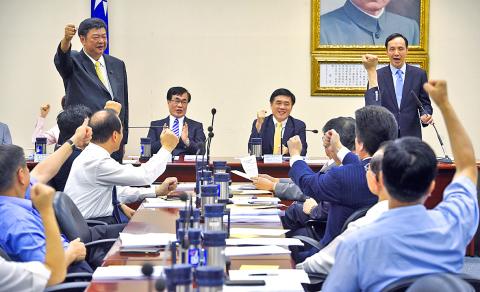A recent spate of Chinese Nationalist Party (KMT) members quitting or planning to leave the party was interpreted by KMT Chairman Eric Chu (朱立倫) yesterday as moves “to pursue individual political interests” following rifts linked to legislative candidate nominations.
Chu made the remarks during a speech at the start of the party’s weekly Central Standing Committee meeting.
A number of party members have quit or turned down nominations because they disagree with the way the party nominated candidates in some legislative constituencies, Chu said.

Photo: George Tsorng, Taipei Times
Chen said he had no problem with KMT members denouncing him or any specific policy, but added that they should not vilify the KMT, because it belongs to everyone, including Republic of China (ROC) founding father Sun Yat-sen (孫逸仙), former president Chiang Ching-kuo (蔣經國) and its 880,000 members, and has a century-old history.
“The KMT has stood firm on its sound fundamental policies and central ideals. You can jump to another boat in pursuit of individual political interests, but please do not vilify the KMT,” Chu said.
Since the KMT’s drubbing in the nine-in-one elections on Nov. 29 last year, several KMT lawmakers have chosen against seeking re-election in January’s legislative elections, while others quit to join the People First Party, rejected the party’s nomination, or considered dropping out of the party.
Opposition lawmakers have said that KMT lawmakers are jumping a sinking KMT ship en masse, which they said was prompted by the pro-unification cross-strait proposals made by the party’s presumptive presidential candidate, Deputy Legislative Speaker Hung Hsiu-chu (洪秀柱).
Hung’s nomination is expected to be confirmed at the party’s national congress on July 19.
During his speech, Chu said he has spoken with Hung about her cross-strait proposals that have raised concerns, adding that she has promised him that her policy would be enacted in compliance with the party’s policy platform.
The KMT’s cross-strait policy is based on the so-called “1992 consensus,” under which both sides agree to “one China” with each side having its own interpretation of what “China” means, and is aimed at ensuring the peaceful development of cross-strait relations and to advocate cross-strait cooperation to create a win-win situation, Chu said.
“It is part of our party platform and thus our policy, which all members nominated by the party should abide by and jointly make feasible,” he said.
Opposition parties say the “1992 consensus” does not exist. A former KMT lawmaker admitted in 2006 to making up the term in 2000.
Hung has previously proposed the “one China, different interpretations” formula be replaced with “one China, same interpretation.”
Meanwhile, independent Legislator Chen Hsueh-sheng (陳雪生) from Lienchiang County, Lienchiang County Council Speaker Chang Yuan-chiang (張永江) and Lienchiang County Councilor Tsao Cheng-chun (曹丞君) were at the KMT meeting, during which Chu welcomed them into the party.
“We are grateful that they joined the party during its most difficult time,” Chu said, adding that next week the party would unveil nominations of several young turks to represent the KMT in running for legislative seats.

SECURITY: As China is ‘reshaping’ Hong Kong’s population, Taiwan must raise the eligibility threshold for applications from Hong Kongers, Chiu Chui-cheng said When Hong Kong and Macau citizens apply for residency in Taiwan, it would be under a new category that includes a “national security observation period,” Mainland Affairs Council (MAC) Minister Chiu Chui-cheng (邱垂正) said yesterday. President William Lai (賴清德) on March 13 announced 17 strategies to counter China’s aggression toward Taiwan, including incorporating national security considerations into the review process for residency applications from Hong Kong and Macau citizens. The situation in Hong Kong is constantly changing, Chiu said to media yesterday on the sidelines of the Taipei Technology Run hosted by the Taipei Neihu Technology Park Development Association. With

A US Marine Corps regiment equipped with Naval Strike Missiles (NSM) is set to participate in the upcoming Balikatan 25 exercise in the Luzon Strait, marking the system’s first-ever deployment in the Philippines. US and Philippine officials have separately confirmed that the Navy Marine Expeditionary Ship Interdiction System (NMESIS) — the mobile launch platform for the Naval Strike Missile — would take part in the joint exercise. The missiles are being deployed to “a strategic first island chain chokepoint” in the waters between Taiwan proper and the Philippines, US-based Naval News reported. “The Luzon Strait and Bashi Channel represent a critical access

‘FORM OF PROTEST’: The German Institute Taipei said it was ‘shocked’ to see Nazi symbolism used in connection with political aims as it condemned the incident Sung Chien-liang (宋建樑), who led efforts to recall Democratic Progressive Party (DPP) Legislator Lee Kun-cheng (李坤城), was released on bail of NT$80,000 yesterday amid an outcry over a Nazi armband he wore to questioning the night before. Sung arrived at the New Taipei City District Prosecutors’ Office for questioning in a recall petition forgery case on Tuesday night wearing a red armband bearing a swastika, carrying a copy of Adolf Hitler’s Mein Kampf and giving a Nazi salute. Sung left the building at 1:15am without the armband and apparently covering the book with a coat. This is a serious international scandal and Chinese

COUNTERINTELLIGENCE TRAINING: The ministry said 87.5 percent of the apprehended Chinese agents were reported by service members they tried to lure into becoming spies Taiwanese organized crime, illegal money lenders, temples and civic groups are complicit in Beijing’s infiltration of the armed forces, the Ministry of National Defense (MND) said in a report yesterday. Retired service members who had been turned to Beijing’s cause mainly relied on those channels to infiltrate the Taiwanese military, according to the report to be submitted to lawmakers ahead of tomorrow’s hearing on Chinese espionage in the military. Chinese intelligence typically used blackmail, Internet-based communications, bribery or debts to loan sharks to leverage active service personnel to do its bidding, it said. China’s main goals are to collect intelligence, and develop a